School can be difficult and tedious, especially if we do little more than prepare to take tests. Do you ever wish that school could be more fun, like when you play games with friends? The interesting thing about playing games with others is that, besides having fun, we become stronger and smarter as individuals, build better relationships with others, and develop the discipline to help us become more successful in school, work, and society.
Why can’t school be more like that?
This is a crucial question as we explore how teamwork can increase our performance and satisfaction in college and develop collaboration skills to help us succeed in our relationships at work and in society. During this workshop, we will learn the rules of Team-Based Learning. TBL is a strategy for integrating teamwork with schoolwork. If you are used to sitting in lectures and preparing for tests, Team-Based Learning may seem very unusual. However, suppose you have the experience of playing on a team to accomplish shared goals. In that case, you will quickly understand the power of teamwork for making learning a fun and enriching experience.
Learning with a team can increase your understanding of course concepts by helping you apply what you learn to solve problems you face at school and work. The typical college classroom is lecture-based, meaning students listen to lectures and prepare for tests. In comparison, students in a team-based classroom spend the semester working with other students to learn, solve problems, make decisions, and accomplish shared goals. To understand why learning to collaborate with others in the classroom is important ask yourself the following question:
After I graduate, will my job involve listening to lectures to prepare for tests, or will it include working with others to solve problems, make decisions, and accomplish goals?
Your answer will help you understand why spending some of your college experience learning to develop skills for successful collaboration is essential.
The Team Players: Individual, Team, and Class
A typical organization has three layers of human interaction: individual, group, and organization (Schermerhorn, Hunt, & Osborn, 2007). During these workshops, we will build a learning organization that consists of individuals, teams, and the classroom [See Image 1]. To be successful, individuals must prepare for and contribute to team activities. In turn, the teams must encourage and develop their members. Likewise, each team will contribute to developing the class, and the class will contribute to developing the teams and the individuals in the class. In other words, to become a successful learning organization, individuals must accept responsibility for developing themselves and others, and groups must take responsibility for developing their members.
The dynamic interaction among individuals and groups within the classroom will help us to learn, grow, and have fun. As with all group processes, this will not always be easy, but learning and performing with others can be more enriching than trying to learn alone.
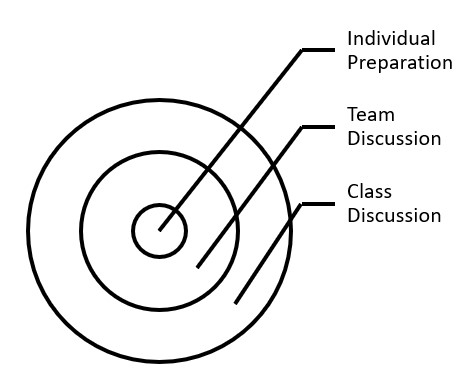
The Game Board
We will use a game metaphor to guide our activities to enhance performance and satisfaction at the individual, team, and classroom levels. The game will involve four key steps in each workshop (Michaelsen, Knight, & Fink, 2002) [See Table 1]:
- Preparation
- Readiness Assessment Process
- In-class Collaboration
- Reflection
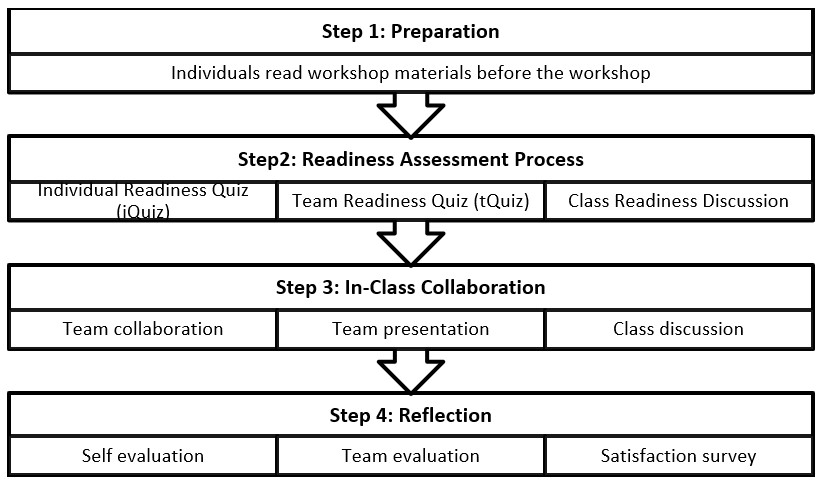
Step 1: Preparation
You will prepare for each workshop by reading the workshop materials. Make sure you read the materials carefully. The activities during the workshop will be based on your readings. The better you prepare, the more you can contribute to your team and classroom activities during the workshop.
Step 2: Readiness Assessment Process
The Readiness Assessment Process aims to help you and your team members build the knowledge you will use to solve problems in Step 3, In-class Collaboration. The Readiness Assessment Process consists of three steps: (1) Individual Readiness Quiz (iQuiz), (2) Team Readiness Quiz (tQuiz), and (3) Class Readiness Exchange. (hanashiai, giron [discussion]
Individual Quiz (iQuiz)
Individual accountability is a basic characteristic of successful teams. To help individual students prepare for participating in teamwork, each student will take an individual Readiness Assessment Quiz (iQuiz) at the start of every workshop. The iQuiz measures your comprehension of the workshop readings. You may also notice that the quiz helps to deepen your understanding of the workshop material. This will help you better prepare to participate in team and class activities. The points for the iQuiz will be as follows:
- Each quiz will have 10 multiple-choice questions related to material in the workshop readings.
- Each correct answer will earn four points; each quiz is worth up to 40 points.
- Your score for the iQuiz will be added to your total individual score and your team’s total score.
- Only you will know your score. However, it is crucial to understand that your preparation for each workshop will benefit you and your team.
Team Quiz (tQuiz)
Following the iQuiz, you will join with a group of other students to take a team Readiness Assessment Quiz (tQuiz), as follows:
- As a team, you will talk about each question on the tQuiz to build a consensus about the correct answers. Each team member should participate in the conversation.
- Once you have developed a consensus, your team will mark its answer by scratching the coating on the answer sheet [See “Scoring the tQuiz].
- When you have answered all the questions, tally your score on the IF-AT form and turn it into the instructor [See “Scoring the tQuiz”].
Increasing individual and team effectiveness during tQuiz. To increase success for you and your team, make sure that you prepare by reading the workshop materials and fully participating in team conversations and activities. Individuals should put aside reserve and demonstrate mutual respect to enhance team effectiveness. Your instructor will observe your group’s activities to assess the quality of your collaboration. During the tQuiz the teacher will evaluate each team member based on four variables:
- Did each individual contribute to the team conversation?
- Did the team contribute to the development of each individual during the conversations?
- What was the score the team earned on the tQuiz?
- What was the combined score of the team member iQuiz results?
Feedback and class conversation
Following the quizzes, the instructor will explain complex concepts and answer questions that individuals and teams have about the content in the workshop reading materials. The combination of teamwork and classroom conversation will help enrich your understanding of the concepts necessary so you can fully participate in Step 3, In-Class Collaboration. This feedback will deliver a key benefit of teamwork: Even when we struggle as individuals, collaborating with our team members and classmates can help us to develop understanding and abilities that exceed those we develop on our own (Ancona & Chong, 1994).
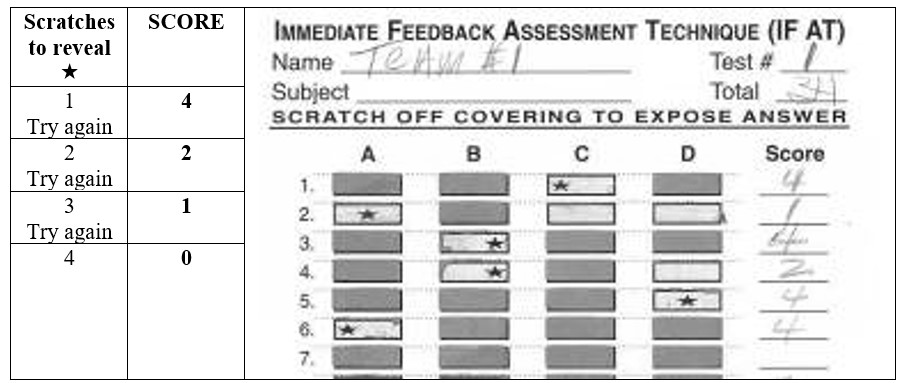
Step 3: In-Class Collaboration
During Step 3, your team members will collaborate to develop a simple project that applies your new knowledge to answer a question or to solve a problem. The teams will then share their answers or solutions with the other teams in the class. For example, during the first workshop, you will do the following:
- Join a group of other students to form a team [the instructor will form the teams]
- Decide on a team name and mascot
- Identify shared goals
- Develop rules for successful teamwork
- Present your team to the rest of the class during a five-minute presentation
Do not worry; everyone will be nervous. But, by working together as a team and as a class, we will develop the knowledge, skills, and confidence we need to be successful at school and work.
Step 4: Reflection
Learning from mistakes and building on success are keys to effective teamwork (University of Phoenix, 2004). This requires that individuals reflect on individual and team performance to identify areas for improvement. At the end of each workshop, the teams will spend a few minutes discussing how to build on their success and overcome challenges.
The team members will privately complete a Workshop Evaluation Form [See “Workshop Evaluation Form” in Appendix]. The Workshop Evaluation Form will help you reflect on each team member's performance and contributions. The form will also allow you to reflect on their performance and satisfaction and allow you to make suggestions for improving classroom activities.
Three Keys to Winning with Teamwork
Throughout the workshops, we will apply three keys to winning with teamwork [See Image 2] (Michaelsen, 1998):
- Accountability at the individual, team, and classroom level.
- Integration and reinforcement of learning and activities.
- Dynamic idea exchange through interaction.
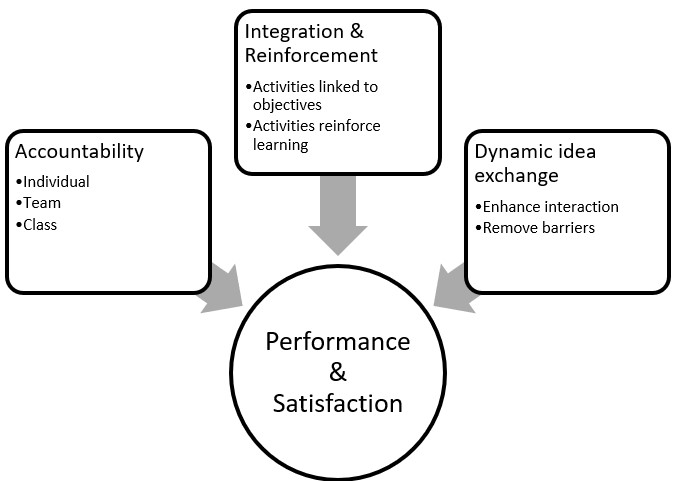
Key One: Accountability
Accountability is critical to a successful team (Jex, 2002; Michaelsen, 1998). In sports, individuals who do not build their skills or show up to practice can cause the entire team to suffer. Likewise, failures to accept, acknowledge, and develop individual team members may diminish individual motivation and ability to contribute to team success.
Applying accountability to team learning in the classroom, students who fail to prepare for teamwork can become a drag to team success. Students who are ready and motivated to perform may be forced to carry the workload of lazy students who do not prepare. Additionally, improperly managed team conversations will likely degenerate into social events where the team cannot accomplish tasks or achieve goals.
Effective teams avoid the problems of individual laziness and social loafing by doing the following (Jex, 2002):
- Making individuals accountable for team performance.
- Making the teams accountable for individual development.
In team learning, individuals become accountable by preparing for team activities and participating in team activities. Teams demonstrate accountability by providing individual team members with feedback and support. Members also enforce accountability through anonymous assessment during the reflection process at the end of each workshop (Michaelsen, Knight, & Fink, 2002; University of Phoenix, 2004).
Individual accountability
The Readiness Assurance Process is designed to promote individual accountability (Michaelsen, Knight, & Fink, 2002). The Readiness Assurance process requires that individuals complete a multiple-choice quiz on the reading materials for the workshop. Students are individually accountable because the individual scores count toward the individual's total points earned for the workshop. Next, during the team quiz, each member converses about each question to develop a consensus on the correct answers.
These conversations generate immediate feedback that helps individual students adjust or strengthen their understanding of the materials. In addition, the conversations provide team members with evidence of an individual’s preparation. Members who are unprepared or who do not contribute receive a lower score from team members and faculty during the Reflection step.
Team accountability
Without team accountability, neither instructor nor students know (1) if the students have achieved their learning goals or (2) if students are taking teamwork seriously (Michaelsen, Knight, & Fink, 2002). Teams can foster accountability by developing practices that do the following:
- Encourage individuals to prepare for team activities
- Facilitate individual participation in team activities
- Help individuals feel comfortable contributing to team conversations and projects
- Foster positive and productive communication
In addition to taking an active interest in creating an environment that fosters mutual development, your team should also recognize that contributing to the development of other teams could help your team members strengthen their understanding and skills. Your team can be accountable for classroom development by demonstrating and applying learning from workshop concepts in your team projects. This will not only help to reinforce learning for everyone in the classroom, but it will also help to show how different teams can use the same concepts to develop different solutions.
Key Two: Link goals and activities
The second key to effective teamwork is to link individual, team, and organizational goals (Michaelsen, Knight, & Fink, 2002). We all share goals of academic, professional, and life success. The workshop readings, assignments, and activities should help us develop knowledge and skills for increasing success at school, work, and in life.
By integrating our goals with team and classroom activities, we can do the following:
- Increase motivation by connecting classroom activities to real-world applications.
- Enhance learning through reinforcement.
- Foster personal growth through mutual development.
To enhance mutual development, individuals will read the same materials, teams will apply lessons from the readings to the same problems, and teams will present their solutions to the class during the same workshop.
Key Three: Stimulate idea exchange
Applying the same concepts to the same assignments will help us reinforce learning and allow us to see how different teams use the same concepts to develop different solutions to the same problem. Exchanging ideas at the individual, group, and classroom levels will enhance creativity and enrich learning (Michaelsen, Knight, & Fink, 2002).
Your success as a team depends on the contributions and success of your team members. The more individuals participate in the team activities, the more successful the team can be. You will see that the readings for each workshop may be challenging. However, you should also find that discussing the readings with your team during the tQuiz helps you to understand better. Similarly, you will see that the workshop activities are too challenging to complete by yourself. However, you also should find that working on the activities with your team makes it easier to accomplish your goals.
Successful teamwork requires we put aside reserve and engage actively with our teams. Each team member should feel comfortable contributing ideas, asking questions, and proposing solutions. The more your team members exchange ideas, the more creative your solutions will become.
Conclusion
The introduction of “Gamer’s Guide to Winning at College through Teamwork” posed an essential question for us to consider as we think beyond college to our relationships, careers, and lives:
After I graduate, will my life involve preparing for tests by listening to lectures, or will it include working with others to solve problems, make decisions, and accomplish goals?
Of course, the answer is that we will not sit in lectures or take tests outside of college. We will apply our knowledge to solve problems while collaborating with people at home, work, and society. This does not mean that lectures and tests lack value; lectures and tests serve an essential purpose in helping us to acquire and demonstrate basic knowledge. However, when we think beyond college, we may recognize that we should spend some of our college life developing collaborative skills to help us be productive members of families, companies, and society.
In providing a framework for learning in a team, “Gamer’s Guide to Winning through College” has provided a framework for helping us to win in life by being effective members and leaders of teams. This framework illuminated the complex interaction among individuals and teams within organizations. Awareness of these levels of social dynamics can illuminate barriers to team success and help us to develop strategies for fostering individual and group performance and satisfaction.
The collaborative process outlined in “Gamer’s Guide” can be as applicable in life as it is to helping us accomplish our goals in the classroom. For example, as a team leader at work, you will want to select members who are ready, willing, and able to do their jobs [Step 1: Preparation]. You will likely have assessment processes through which you evaluate team member readiness to help accomplish group goals, like interviews and performance evaluations [Step 2: Readiness Assessment]. You will probably coach your team in collaborative skills that will allow them to more effectively accomplish goals and complete projects [Step 3: Collaboration]. Finally, whether things go right or wrong, your team will want to reflect on its successes and failures; this will help your team determine how it can improve future activities by learning from mistakes and building on successes [Step 4: Reflection].
Throughout these steps, you will also find that the keys to fostering individual and team effectiveness include
- establishing accountability at the individual, team, and organizational level;
- integrating team objectives and goals with the personal goals of team members and the company, and;
- fostering a dynamic exchange of ideas to encourage creative problem-solving.
In short, you may find that the secret to creating an effective work team is to make it a learning team like the one you will build in the classroom.
-----
Note. Adapted from Assessing the viability of team learning with remedial students in a lecture-based Japanese higher education culture (Duncan, 2013), this is a workshop script from the Team Hachi Project, a series of workshops developed to introduce group dynamics concepts to enhance student performance and satisfaction in college classrooms.
-----
References
Jex, S. M. (2002). Organizational psychology: A scientist-practitioner approach. New York: John Wiley & Sons.
Michaelsen, L. K., Knight, A. B., & Fink, L. D. (2002). Team-based learning. Sterling, VA: Stylus Publishing, LLC.
Schermerhorn, J. R., Hunt, J. G., & Osborn, R. N. (2007). Organizational Behavior (9th ed.). New York: John Wiley & Sons, Inc.
University of Phoenix. (2004). Learning team handbook. Retrieved October 7, 2008, from Apollolibrary.com: http://www.apollolibrary.com/LTT/toolkit1.aspx?bc=1




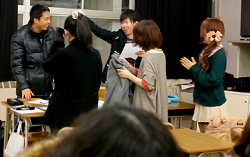
![Your brain can keep growing, adapting, and learning at any age, if you are willing to put in the effort [Image: Copilot]](/images/Images/best-years-for-adult-brain300.png)
